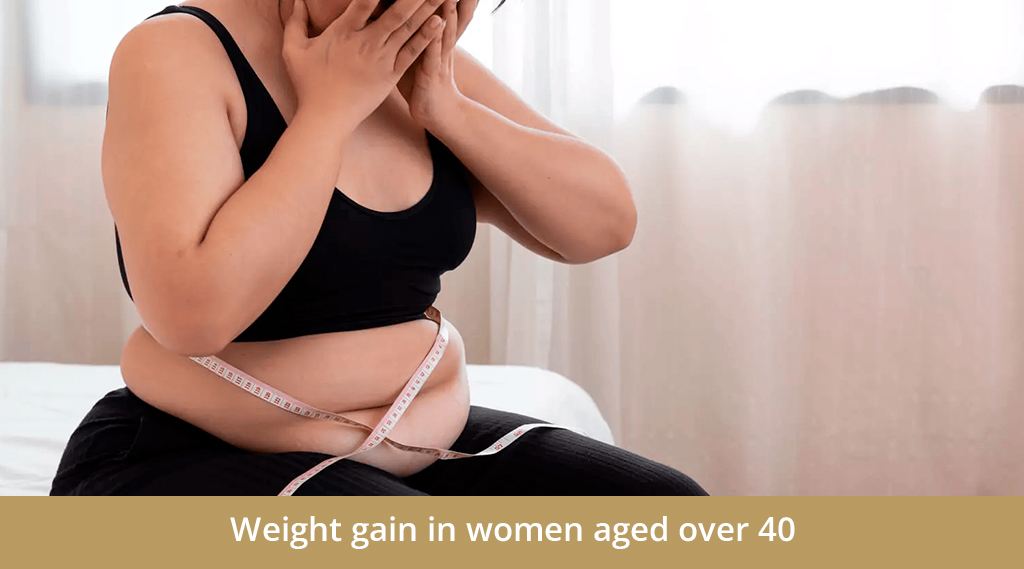
1. Sleep pattern changes
Sleep is one of the most common alterations in climacteric. Waking up at 3am, having difficulty sleeping or waking up earlier affects many women after 40 years of age and are often not associated with climacteric. Studies show that 4 nights of sleep restriction (less than 6 hours) was able to reduce insulin sensitivity and fat oxidation in postmenopausal women. Lack of nutrients can also exacerbate this situation.
2. Muscle loss
Skeletal muscle is considered today, the largest endocrine gland in our body. Through its stimulation there is a release of various substances, among its functions is energy expenditure. After 40 years old, the loss of muscle mass will result in the loss of potential caloric expenditure as muscle uses more calories than fat. This loss is significantly accentuated in menopause, where energy expenditure will be even lower and the chance of weight gain will be much greater. Losing weight is not just lowering the weight on the scale, but reducing the percentage of body fat.
3. Thyroid
Dysfunction is common in women, especially after 50 years of age, but in the climacteric, it is important to be aware of the changes. Some symptoms are very similar and are less obvious with advancing age, making clinical diagnosis more difficult, but they can have important deleterious effects.
4. Depression
Depressive symptoms may be characteristic of this phase and most of the time it is also associated with a sedentary lifestyle. It is a common climacteric symptom that is little treated, which leads to tiredness, indisposition, discouragement, search for the comfort in food, feeling guilt and weight gain.
5. Inflamed intestine
One of the climacteric effects for some women is constipation and a reduction in the production of some enzymes. These two scenarios can lead to dysbiosis and making it difficult to lose weight. The diet after 40 years of age should take into account possible food intolerances not previously presented, difficulty in digestion and symptoms such as bloating, and constipation.
Keep in mind it is very important to seek the help of a professional when starting any diet, at SKINIII our team of specialists are here to help you.
Recent Posts
-

Anti-Aging IV Drip Therapy Benefits and How It Works
Ageing is a natural biological process that affects every living organism over time. As humas, when we age, cellular repair slows down, hydration levels decrease, oxidative stress increases, and essential nutrient absorption becomes less efficient.
January 24, 2026 -

IV Therapy vs Oral Supplements: Which Is More Effective?
Many people take daily supplements because they feel like a part of their routine, but the body does not process every tablet the way anyone expects or believes it does. Some days, absorption can be steady; other days, it can't be guaranteed, for reasons that have little to do with the dose itself... Read more
January 21, 2026 -

Types of STD Tests: Blood, Urine, Swab and Rapid Tests Explained
STD testing is considered essential for early detection, accurate diagnosis, and effective treatment of sexually transmitted infections. Many STDs show little or no symptoms, making regular screening an important part of sexual health and wellbeing ... Read more
January 16, 2026 -

How Modern Labs Detect STDs: The Science Behind the Tests
Sexually transmitted infections can often stay silently in the body, sometimes creating subtle changes that leave a person uncertain about what is happening. Modern diagnostics and STD/ STI lab tests help bring clarity by studying tiny pathogens that the body is being exposed to long before it becomes an actual health risk.
January 06, 2026 -

Multivitamin IV Drip: How Beneficial Are They?
A Multivitamin IV Drip is a sterile infusion that combines nutrients such as vitamin C, B-complex vitamins, magnesium, and calcium in a balanced, hydrating solution. At Health Call, this popular treatment is used to support overall hydration ...
December 10, 2025




